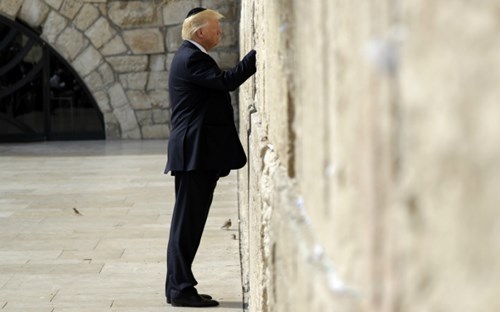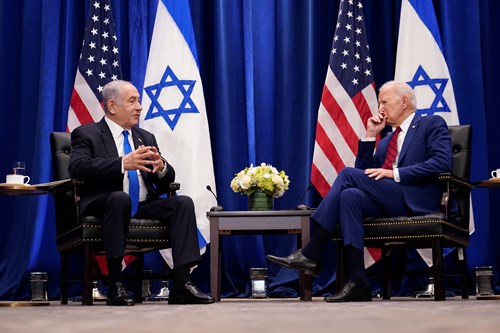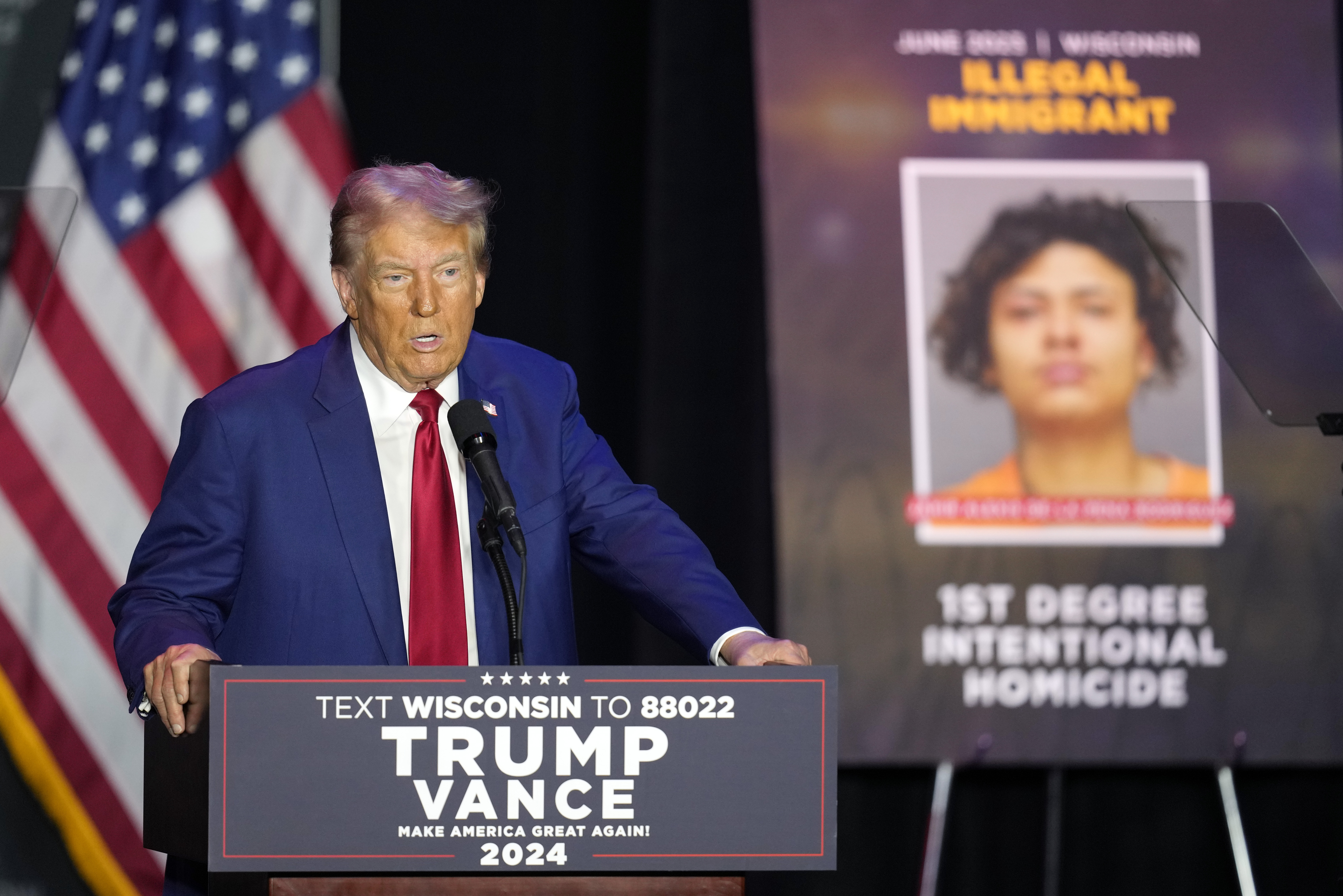A leading Middle East analyst predicts Donald Trump’s overwhelming defeat of Kamala Harris in the presidential election will pave the way for a quicker end to the war between Israel and Iran and its proxies, a war that began more than a year ago with the Hamas rampage of murder and kidnapping against Israeli civilians.
“There’s every reason to believe that the work can end quickly,” Carolina Glick, senior contributing editor for The Jewish News Syndicate, told the "Washington Watch" program Thursday.
 After President Joe Biden stood staunchly with Israel in the hours after the attack last Oct. 7, the support quickly morphed into heavy-handed demand for a ceasefire with Hamas. When that demand was resisted, the Biden administration delayed munitions shipments and threatened a weapons embargo.
After President Joe Biden stood staunchly with Israel in the hours after the attack last Oct. 7, the support quickly morphed into heavy-handed demand for a ceasefire with Hamas. When that demand was resisted, the Biden administration delayed munitions shipments and threatened a weapons embargo.
But the landscape in the U.S. changed Tuesday as Trump carried 30 states, won the popular vote and totaled 312 electoral votes.
Israel Prime Minister Benjamin Netanyahu was among the first world leaders to congratulate Trump, his office issuing a statement that read:
Dear Donald and Melania Trump, congratulations on history’s greatest comeback! Your historic return to the White House offers a new beginning for America and a powerful recommitment to the great alliance between Israel and America. This is a huge victory! In true friendship, yours, Benjamin and Sara Netanyahu
The Trump-Israel worksheet
Trump’s victory was celebrated, it appears, in Israel even more than in the United States. Two-thirds of Israelis supported the outcome, polls showed.
That post-election snapshot was consistent with pre-election polling that showed Israel’s overwhelmingly in Trump’s corner, many remembering Trump’s pro-Israel policies from his first term.
As White House resident after the 2016 campaign Trump:
 *Moved the U.S. Embassy to Jerusalem.
*Moved the U.S. Embassy to Jerusalem.
*Recognized Israeli sovereignty in the Golan Heights.
*Recognized legality of Israel communities in Judea and Samaria.
*Moved the U.S. away from the idea of a two-state solution for peace with the Palestinians.
*Defunded UNRWA and the Palestinian Authority.
*Oversaw the conclusion of the Abraham Accords, bringing peace with four Arab-Muslim states for the first time in two decades.
“Trump was the most pro-Israel (U.S.) president that Israel ever had," Glick told show host Tony Perkins. "He was an extraordinary transformational leader in terms of America-Middle East policy. He was very successful."
Glick reminded Perkins, and his audience, that Trump had walked away from the Biden administration's nuclear deal with Iran. He placed "crippling sanctions" on Iran that dried up its terror-funding resources.
Biden tears down U.S.-Israel progress
Then things changed after the 2020 election in the U.S.
“Then the Biden administration came in. They basically tried to kill the Abraham Accords by trying to force everybody to bow down again to the Palestinians in their midst. They reinstated U.S. financing to UNRWA which turned out to be an in-house terror organization,” Glick said.
The war brought a new set of challenges in the Biden-Israel relationship.
 There have been threats of an arms embargo, constant calls for a ceasefire and much more.
There have been threats of an arms embargo, constant calls for a ceasefire and much more.
“They have tried to block every strategic action that Israel has taken and wishes to take in Gaza, in Lebanon and of course in Iran,” Glick said. “They’ve just been horrible. They’ve ostracized our leaders; they’ve threatened to sanction our ministers. We’ve never had a more hostile administration.”
As much as Israelis appreciate the U.S.-Israel relationship during Trump’s first term, they’re equally excited to turn the page from “one long slog” with the Biden administration, Glick said.
Not all in the Middle East share Israel’s joy with Trump’s big night.
“The U.S. elections are not really our business. Our policies are steady and don’t change based on individuals. There will not be change in people’s livelihoods,” said Fatemeh Mohajerani, a spokesperson for the government of Iran.
Iran is still planning an attack in retaliation for Israel’s retaliatory strikes on Oct. 25.
“The Zionists do not have the power to confront us, and they must wait for our response. Our depots have enough weapons for that,” Ali Fadavi, deputy chief for Iran’s Revolutionary Guards, said on Wednesday.
The Israel Defense Forces, buoyed by superior intelligence gathering, have taken out countless leaders and dealt significant losses to Hamas and to Hezbollah, which began attacking northern Israel almost as soon as Hamas unleashed its terror in the south.
Now, as sabers rattle from the Bank of Terror, Iran, Glick sees the U.S. election results as the fast track to peace.
 “The reason it’s been so prolonged is that the United States kept subverting Israel’s war effort,” she said.
“The reason it’s been so prolonged is that the United States kept subverting Israel’s war effort,” she said.
She said Netanyahu is a hero not only for his leadership but for what he’s had to endure from the current U.S. president.
“The fact that we’re still in this fight, despite all the Biden administration’s efforts to force Israel to capitulate without defeating Hamas, without dismantling Hezbollah forces that were perched along the border with northern Israel, is a testament to the strength and leadership of Prime Minister Netanyahu," she insisted.
Trump, soon after starting work, will “drastically increase sanctions” against Iran, The Wall Street Journal reports.
In a separate AFN interview, conservative activist Gary Bauer says Netanyahu has a "new lease of life" after Trump's win.
"By Donald Trump winning the presidency again, that alliance will be strengthened," he says. "That will be good for peace. It'll be good for the world."
The current U.S.-Iran landscape
Iran has twice attacked Israel with hundreds of ballistic missiles. Most have been successfully shot down with the U.S. and a few other nations participating in the defense. The U.S. has also moved warships into the region though the politics make questioning the commitment to Israel’s defense fair game.

After the attacks “the administration’s response was to protect Iran’s nuclear installations from Israel by threatening Israel again with an arms embargo and U.N. Security Council condemnations if Israel attacks Iran’s nuclear sites.
“It’s really just been one long slog with the Biden administration, and Harris promised to be even worse than Biden from Israel’s perspective. That explains, I think, the jubilation,” Glick said.







